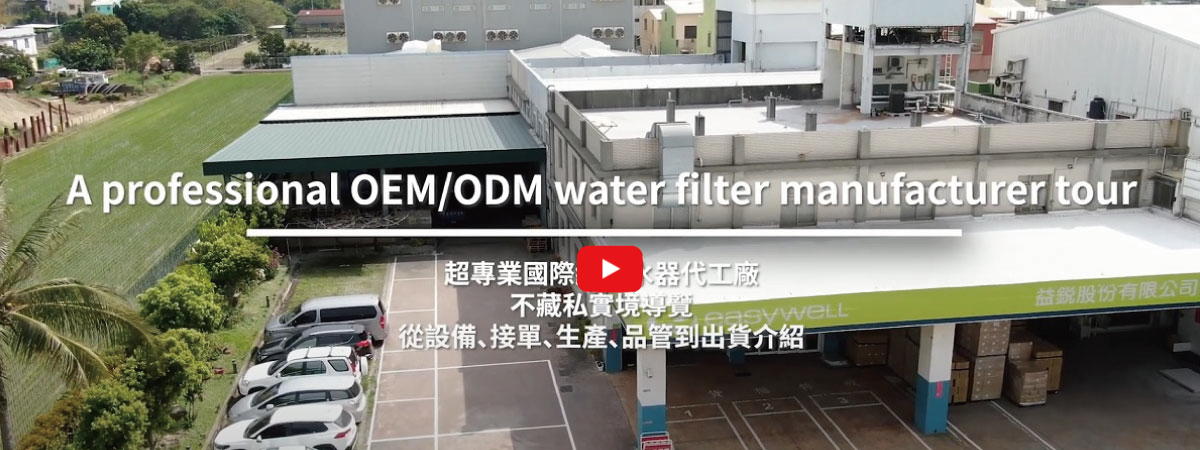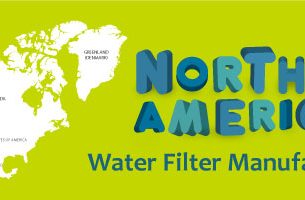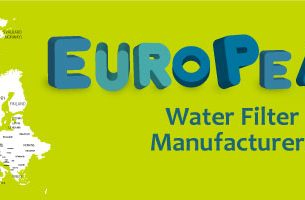Foreword
Filters play a significant role as the kidneys of water purifiers and there are hundreds or even thousands of filter manufacturers around the world. This article will focus on the top 100 filter manufacturers in Taiwan.
Taiwan has always been a major manufacturer of water hardware. When both the information and technology of reverse osmosis water purifiers spread to Taiwan in the 1980s, it was logical that many manufacturers in this major water hardware country wanted to move into the reverse osmosis (RO) industry. Therefore, from the 1980s onwards, there was a gradual increase in RO machine production and assembly companies and, specifically in the past 30 years, more and more companies have become involved in water purification in Taiwan, becoming well-known internationally.
At this present time, in addition to selling their own brand products, I believe that more than 80% of these companies are still mainly producing RO machines or water purifiers for foreign customers. If foreign customers want to find a suitable OEM company among the many companies in Taiwan it can often take a lot of time because, although it can be relatively easy to locate a factory with a Google search using either the Internet or on the phone, it’s difficult to tell if the company is an assembly plant or just a trader. If the company is not a manufacturer it is almost impossible for foreign customers to get either the best price or professional technical support from it.
For RO machines or water purifiers, the quality and effectiveness of the filter elements are very important. Therefore, in order to allow customers looking for a factory to find a manufacturer within as short a space of time as possible, this article has specifically sorted companies that manufacture and produce filter elements. For reference.
The conditions for selecting water purifier OEM/ODM manufacturers are as follows:
2-1The company is a company registered in Taiwan
As mentioned previously, the filter element is very important to the water purifier so, of course, the foundry must be a legally registered company, ensuring the government has taken the first step. Taiwan is a world-renowned producer, providing affordable but high-quality products. Therefore, this should be the first criteria.
2-2Have received export orders and have export experience
When first approaching a company it must be an English-speaking business, as foreign customers looking for OEM/ODM water purifiers can communicate more easily, because companies with export experience are familiar with the export process. In addition to reducing ineffective communication with customers, if the company encounters foreign customers who have never imported products, they can also share their experience to help customers complete orders and deliveries in a timely fashion. Additionally, if it is a company that sells to many different countries, customers from a range of countries can also understand the special needs of water purifier specifications in various markets
2-3Accept customer OEM orders
Some companies only produce filters for certain specific specifications, so it is difficult for us to judge whether the selected company can fully accept OEM; however, the companies in the following table, through our data collection, all have their own filter production facilities. In this way, the company looking should save a lot of time in finding a factory that produces filter cores.
2-4Has its own production line
It is only by a company having its own production line that can we grasp the delivery date of the product, ensuring customers rarely have to wait for long to know the delivery date of the product. In recent years in particular, shipping space has often been tight and shipping schedules are still very chaotic. If customer’s delivery dates cannot be answered directly, the ship cannot be ordered, and the goods shipped immediately. Therefore, under the current situation, where shipping schedules and sea freight are both uncontrollable, fast and on time delivery for an order is relatively important. In addition, the most important factor is that the factory has its own production department, meaning it is relatively easy to control the quality of the products. If raw materials, production, quality control, and shipment are all controlled by the same company, customers can feel at ease about receipt of the products.
Before reading the following content, we first need to understand the basics of the filter core. Generally, the filter core has three specifications, namely:
3-1.General Standard Filter
Filters come in many sizes, such as: 10”, 20”, 30” and 40” lengths, with widths divided between 2.5” and 4.5”, please refer to picture 1 below. 10″ refers to a length of 10 inches, with 1 inch being 2.54 cm. 2.5″ refers to the width of the filter. This kind of standard filter element cannot be used alone. The filter element must be put into a filter bottle for use, so that water can pass through in a smooth way allowing filtration to be achieved. We will write another article about filter bottles to introduce the various kinds of filter bottles for the reference of trustees.
Among them, the 10”x 2.5” filter is the most commonly seen filter on the market, often seen in hardware stores and hypermarkets, because it is a filter that is often bought. If not required for special needs, this is the standard for household filters of this specification.
As a matter of fact, the so-called ‘10″ length’ is actually 9-7/8″ or 9-3/4″. These two are standard lengths. The traditional filter bottles commonly found on the market are in line with the above sizes of filter cores.
Most of these filters are installed in either traditional RO reverse osmosis or in ordinary water purifiers. The three most widely used filters are: PP, CTO, and UDF.
• PP is a filter core made of melt-blown polypropylene, which is used to block large impurities in water, such as sediment, hair, rust, or algae. It is usually installed in the first filter as the primary filter.
• UDF is granular activated carbon with super strong adsorption, which can effectively remove residual chlorine, odors, and decolorization. If it is placed in front of the film, it can greatly increase the life of the film.
• CTO is activated carbon rod, which is sintered using activated carbon. It is mainly used for the removal and filtration of chlorine, odors, decolorization, and impurities. It is usually installed in the second or third filter.
As for standard filters of the other sizes mentioned in this article, they are mostly used in whole household, commercial, and industrial water purification systems.
3-2. Regular Disposable Housing Filter
The T33 filter element (also known as the small T) is a typical 10” long example of this type of filter seen in the market. For a traditional RO machine, this is the filter element installed behind the membrane. It does not need to be loaded into the filter bottle as it is directly connected to the joint and PE pipe for use. Its purpose is not for filtration, but to sweeten water quality; due to its filling of “coconut shell particle activated carbon”, the water tastes better when drinking.
10” here also refers to the general term for the length of the filter core. The size of water inlet and outlets are mostly 1/4” (commonly known as 2 points), divided into NPT internal teeth or quick-connect tube assembly. Of course, there are also 3/8” (commonly known as 3 points) and 1/2” (commonly known as 4 points) external and internal teeth specifications, but these are not often seen. The purpose for different sizes of water inlet and outlet means that the filter can be installed in a number of different places, such as toilet, refrigerator, or garden. In addition, there are general-gauge disposable housing filters that are longer than T33, usually 11″ in length. There are also filters with a length of about 6″, which can be used in water purifiers with limited space. The most common of these are PP, Carbon block, Granular Activated Carbon (GAC), and resin. Different filter materials can be used to fill the filter core shell according to the different needs, and the different filter materials have different filtering effects. The following is the style of the general standard disposable housing filter for the readers’ reference.
The above two types are all standard filters that users can purchase quite easily from general hardware or water supply stores in the market.
3-3. Special Quick Release Filter Element
As the name implies, this is a special specification filter. Over the past few years, this type of filter has gradually become more popular. Because householders are able to replace this filter by themselves, there is no need to ask a plumber to do it, which is ideal in an age where labor is both scarce and expensive; also, because it is a quick-release design, people of all genders and ages can replace them by themselves, making them more convenient than traditional filters. However, due to the range of different manufacturers and different specifications of the filter element due to their special specification, they must be purchased in a special store.
Although this is a special filter, the water inlet and outlet of the pipeline are similar to the above-mentioned styles, with either 1/4” or 3/8” specifications, and the filter materials in the filter are generally the same as above.
Above are several different quick-release filter styles, which are provided here for the reader’s reference.


